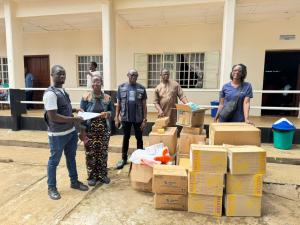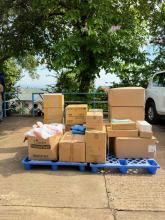WHO strengthens Sierra Leone’s mpox response
As Sierra Leone continues to report new cases of mpox, the Ministry of health and partners are strengthening Infection prevention and control (IPC) measures in a bid to protect the country’s health workers.
To reinforce these efforts, the World Health Organization (WHO) visited the Hastings Treatment Centre to donate essential medical supplies. Items such as face masks, surgical and isolation gowns, protective goggles, gloves, and boots will help frontline health workers to reduce their risk of infection and deliver care safely.
“When you are on the frontlines, every layer of protection matters,” said, Dr Darlinda Jiba, a healthcare worker. “We are seeing more cases every day. But knowing we are not alone in this fight helps us stay focused.”
WHO’s efforts go beyond medical supplies. The organization has deployed public health experts, funded key areas of the response, and continues to work with national authorities to coordinate surveillance, improve community engagement, and train health workers.
As part of the visit, the WHO team also spent time with patients receiving care at Hastings Treatment Centre, offering encouragement and listening to their experiences. For patients isolated during illness, such interactions bring reassurance and hope.
“Infection prevention and control is the first line of defense in any outbreak, and health workers must be fully protected to carry out their lifesaving work,” said Dr Ameh George, WHO Representative in Sierra Leone. “WHO remains committed to supporting the government of Sierra Leone not only with critical supplies but also with expertise and funding to strengthen the response to mpox. We stand with health workers and patients alike.”
“We are grateful for the continued support from WHO at this crucial time,” the Honourable Minister of Health, Dr Austin Demby said. “These supplies, along with the technical and financial aid, are helping us protect our health workers and provide better care to patients. Our response is stronger when we work together and this partnership reflects that.”
WHO’s contribution forms part of a broader effort to protect health workers, encourage early detection of symptoms, and support community-level awareness. While the government and partners are scaling up case detection, contact tracing, and increasing awareness, the message remains clear: stay alert, stay protected.
With the continued support of health workers, community members, and partners, Sierra Leone is committed to slowing the spread of the virus and protecting the health of its people.
Emergencies Communications Officer
WHO Africa Regional Office
nwonyec [at] who.int (nwonyec[at]who[dot]int)
+2348034645524
WHO Sierra Leone
Email: sharkahm [at] who.int (sharkahm[at]who[dot]int)




